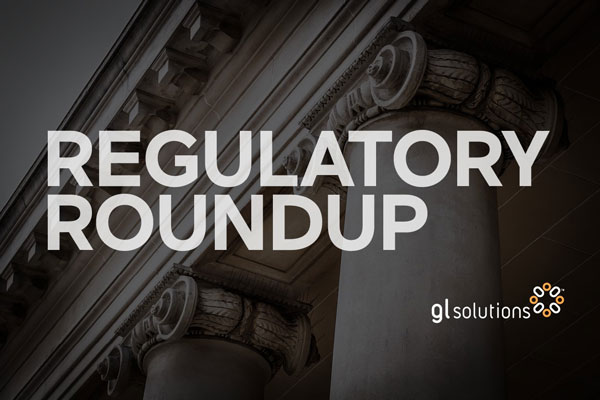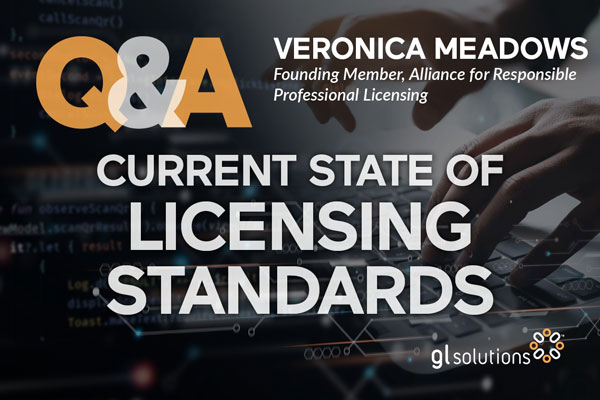Alliance for Responsible Professional Licensing’s founding member Veronica Meadows discusses the current state of licensing standards. She brings her experience as the Chief Strategy Officer for the Council of Landscape Architectural Registration Boards to offer feedback on a range of issues facing regulatory agencies—from universal licensing to artificial intelligence. Listen to our entire interview with Veronica Meadows on our Talkin’ SaaS podcast.
GL: Tell us about the Alliance for Responsible Professional Licensing.
Veronica Meadows: So first and foremost, just want to share that the Council of Landscape Architectural Registration Boards (CLARB) is a founding member of the Alliance for Responsible Professional Licensing (ARPL). ARPL is a national coalition of responsible licensing advocates. We’re composed of professional and regulatory associations that represent highly complex technical professions, including architecture, landscape architecture, engineering, and surveying and accountancy. The professions that we represent are all licensed in 50 plus US states and territories. And we all have established uniform standards for licensing, education, examination and experience, and proven national mobility models for the professions that we are engaged with.
ARPL promotes a responsible, balanced approach to professional licensing. And our purpose really is to educate policymakers and the public on the importance of protecting licensing for professionals, or professions that have high public impact. We also work to develop and provide best practices, and practical solutions to help states solve occupation-specific licensing challenges.
GL: Can you talk about the recent ARPL study that looked at how lowering licensing standards raises business risks?
Veronica Meadows: Yes, sure. So ARPL, commissioned the Benenson Strategy Group to survey, I think about 600 decision makers for small and mid-sized businesses about the impact of professional licensing on their businesses. And I mean, it was really quite clear that businesses overwhelmingly support responsible licensing standards. You know, the people we spoke to are business owners that employ, architects, landscape architects, engineers, and then also the business owners that contract with these professionals. And what we found is that those that rely on highly complex and technical professions need assurance that their employees are qualified and competent. So for example, 92% of business owners say that it’s important to require a license to practice for professions like accounting, engineering, architecture, landscape architecture, surveying. Ninety percent of them said that professional licensing protects their customers and the public from receiving substandard work. Business owners also agree that professional licensing helps them hire qualified professionals and build strong business reputations. Ninety percent said it protects and enhances their reputation. Ninety-two percent said licensing helps them assess qualifications accurately in making hiring decisions.
GL: When you refer to licensing standards, can you clarify what you mean by that?
Veronica Meadows: We are talking about the standards for education, experience and examination, and ensuring that those standards are rigorous enough to ensure public protection, but also have the built in flexibility to be equitable and accessible for practitioners entering the profession. But public safety is the utmost outcome, that licensing is really put in place to ensure. And that is done through ensuring that individuals have the adequate educational background. They’ve gained experience in that area and that they’ve demonstrated competency through a professional licensing exam that says, I have the level of qualification that ensures that I can practice without endangering the public.
GL: What licensing trends are you seeing? And what are your thoughts on the universal licensing trend?
Veronica Meadows: Universal licensing is a very nuanced policy approach, and it definitely has some considerations that we would urge policymakers to really think about before making policy decisions that might actually have unintended consequences. I mean, unfortunately, what we’re seeing is very broad brushed policies that are designed to kind of design wholesale solutions that don’t necessarily consider the nuances of each licensed profession. Universal licensure really attempts to reduce barriers to mobility, which is a good thing. And we support that. However, this particular trend and reform policy doesn’t take into account that some professions already have national reciprocity models. So when they implement these policies, they risk complicating those systems in place that are working, which confuses reciprocal applicants and causes unintended consequences to the public.
Universal licensure kind of reduces the authority of individual licensing boards. It imposes a requirement that a board shall issue a reciprocal licensing through statute changes, instead of leaving the discretion to the board. It really doesn’t differentiate between occupations and professions. And some states passed, you know, forms of universal licensing, which include residency requirements, which, quite frankly, makes the pathway more cumbersome, then the existing models that are in place.
And then in other places universal licensing language relied on substantially equivalency, you know, between states and effectively relying on the licensing boards to determine if an out of state applicant comes from a jurisdiction with requirements that would satisfy the new states requirements. But so universal licensing is one trend that we’ve seen.
Another trend that we’ve started to see is undermining the ability for a licensure board to do what they are charged to do, which is to administer and enforce licensure policies that are put in place to protect the public. Lots of review commissions stood up mandated sunset review. And in some of these efforts that we’ve seen, you know, really are to change the composition of the board or to consolidate boards. This can unfortunately result in the reduction or elimination of the really needed subject matter expertise on boards and puts the decision-making authority in hands of state employees that really, quite frankly, aren’t qualified to make those decisions. And there’s also been attempts to remove board authority in the complaint and disciplinary process which, you know, that’s really the public’s due process should they ever be harmed by it.
GL: How do you respond to those that say we have a worker shortage and need to lower the barriers of entry to get more professionals working?
Veronica Meadows: I think workforce development and building strong economies from state policy standpoint is probably where they’re coming from. So, I think their intentions are good. But I think poor understanding of the systems and processes that are in place contributes to their attempt to solve those challenges. And I would actually argue that many of the national regulatory associations like CLARB and others for other professions are looking internally and working with their own members to say, okay, we know, licensure needs to maintain enough rigor to ensure public protection, but what can we do within our own systems and processes? You know, how can we look critically at the requirements and say, okay, how do we eliminate unnecessary friction while maintaining the rigor? And we have to look at that by saying, okay, what friction in the process doesn’t have a direct public protection outcome? And if we find those things, we have a responsibility to eliminate or reduce those things. And I think that’s something that’s a lesson that we can all learn within the regulatory community to look critically at our requirements at our systems our processes, and if there is friction there that doesn’t have a direct public protection outcome, then we have to figure out how we’re going to address that.
GL: As a regulator, how do you identify ways to improve the licensure process?
Veronica Meadows: Now, I can only speak for CLARB because I’m intimately knowledgeable about our systems and processes. But we went through that process a few years ago. We surveyed and spoke with licensing boards, and we said, where are you experiencing friction in the process? We spoke to individuals working through the licensure process, or had been through the licensure process and asked them where they met friction in the process. And we kind of took all of that information. We identified some key areas where we knew we were going to have to focus our efforts in making improvements. One was varying requirements for licensure from state to state, because, that creates confusion and frustration. We knew that we were going to have to address creating efficiencies in the time to licensure. And there were several areas where we focused our efforts. And ultimately, what we came away with was we need to ensure that our licensing requirements are defensible, that they’re rooted in data that shows us that these are the right requirements, and that they’re equitable and accessible.
And one of the ways that we have addressed that within the landscape architecture profession, has been recognizing that there are alternative paths to licensure, and recognizing that not everyone has access to a very expensive five year bachelor’s program in landscape architecture, and recognizing that our demographics of our country is changing, and we want our profession to be representative of the communities that they helped to build and support. And so for us, recognizing and valuing alternative paths to licensure, I think, has been a big step forward in licensing for landscape architects. And we are currently working with our member jurisdictions to revise their licensing requirements to also recognize alternative paths to licensure.
GL: How can technology support regulators and the licensee population?
Veronica Meadows: Well, I think technology’s integration into the regulatory space is a topic of significant importance and discussion. You know, I mean, we think about AI. That’s a logical technology solution. But, you know, the extent to which AI should influence regulatory matters is an issue of ongoing debate. It’s likely that AI can enhance the efficiency of regulatory operations. I think we see AI is a valuable tool that can streamline processes. But I think it’s really important to acknowledge and address the associated risks and limitations too. And I just don’t think we know enough about it yet. But there is a cautious and thoughtful approach to implementation of technology and specifically AI in regulatory work. And there’s still a lot of work ahead of us on that. So, we’re still very much learning there.
GL: How can people get involved in ARPL? Are there membership opportunities?
Veronica Meadows: Well, not necessarily in ARPL, but what I would say is where practitioners or members of the public have an opportunity to get involved is really through their localities. So if you are a licensed landscape architect, or architect or engineer, serve on your local licensure board. And even members of the public can serve on licensing boards. And if you’d asked me 24 years ago, what a licensing board was, or that one existed out there to serve my interests, I wouldn’t have known that. So I think we have a long way to go to help the general public better understand the vital role that licensing boards play. But there are opportunities to serve on these boards as a subject matter expert in a particular field, or as a member of the public.
The other way professionals can really get involved is through their local professional society that represents the profession that they belong to. And in terms of being engaged in ARPL, ARPL has lots of information out there available on our website at responsiblelicensing.org. You can also find us at the at The ARPL on Twitter or X, LinkedIn and Facebook.
Learn More
Listen to our entire interview with Veronica Meadows on our Talkin’ SaaS podcast. And learn more about the ARPL study, The Critical Role of Licensing in Business Success.
Editor’s note: Answers edited for clarity and brevity.
Time to Modernize
GL Solutions helps your regulatory agency run, grow and adapt through modern software and automation that helps solve your agency’s greatest challenges. To learn more, contact us.
To receive the latest regulatory news delivered to your inbox each week, subscribe to our newsletter.


